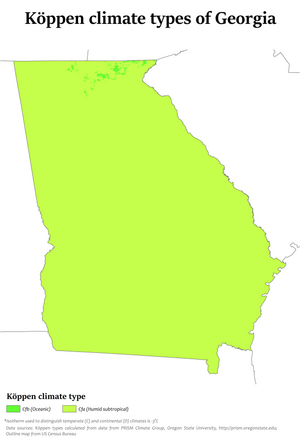This article contains too many or overly lengthy quotations. (May 2022) |

Climate change in Georgia encompasses the effects of climate change, attributed to man-made increases in atmospheric carbon dioxide, in the U.S. state of Georgia.
Studies show that Georgia is among a string of "Deep South" states that will experience the worst effects of climate change,[1][2] with effects including "more severe floods and drought", and higher water levels "eroding beaches, submerging low lands, and exacerbating coastal flooding."[3]
In coming decades, climate change will cause higher temperatures, and more severe flooding and droughts in the state, according to a 2016 pamphlet published by the United States Environmental Protection Agency. The temperature changes will increase the risk of heat stroke and other heat-related illnesses.[3]
- ^ Meyer, Robinson (June 29, 2017). "The American South Will Bear the Worst of Climate Change's Costs". The Atlantic.
- ^ Wood, Ada (November 15, 2018). "Georgia will face danger from climate change". The Signal.
- ^ a b "What Climate Change Means for Georgia" (PDF). United States Environmental Protection Agency. August 2016.